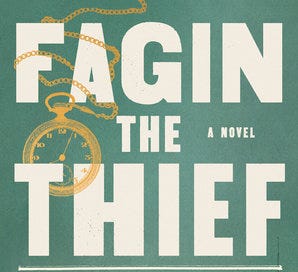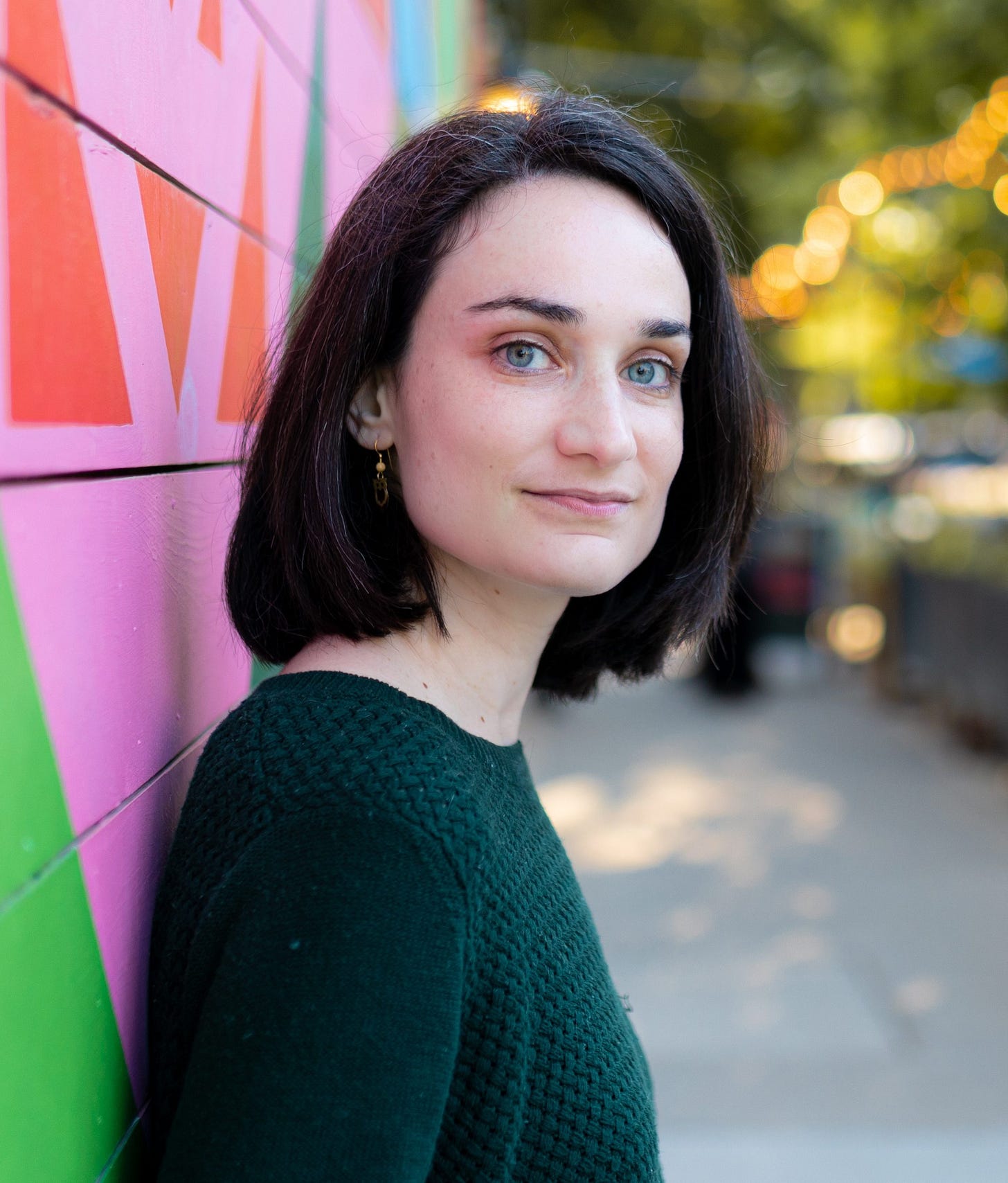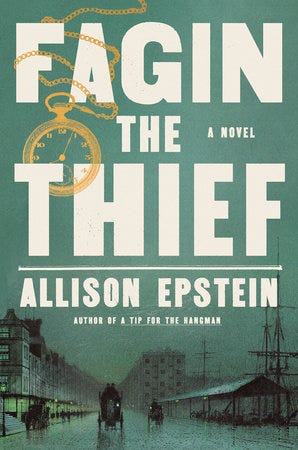Fagin the Thief
An interview with Allison Epstein about her gorgeous new retelling of Oliver Twist
Hello, friends—
Recently, I promised to share interviews with authors of new retellings I’ve loved, and I want to start with Allison Epstein’s new book, Fagin the Thief. Allison is one of my favorite historical fiction authors. I befriended her on social media years ago when I became obsessed with her debut novel, which I read while I was researching Elizabethan England. A Tip for the Hangman is a gorgeous portrait of the playwright Christopher Marlowe’s last years that manages somehow to be both a beautiful love story and a thriller. I also loved her second novel, Let the Dead Bury the Dead, an alternate history set in St. Petersburg that includes fractured retellings of traditional Eastern European folktales.
Fagin the Thief is a retelling of Oliver Twist from the perspective of one of Dickens’ most famous villains: the ringleader of child thieves who gets Oliver to steal for him. The novel—part villain origin story like Wicked or Circe, part Dickensian ghost story—has been getting a lot of buzz and acclaim, and rightly so. The Wall Street Journal called it “an empathetic saga of troubled souls,” and the Chicago Review of Books called it “a complex exploration of the life of an underdog.” In short, the novel is both heartbreaking and wickedly funny, beautifully written, and the best sort of retelling: one that makes us think about why the original was told the way it was. It offers a nuanced portrait of Fagin, tracing his capacity for compassion as well as his flaws as it corrects Dickens’ caricature. The original portrayal of Fagin is so antisemitic, Dickens was criticized for it in his own time.
But that’s enough from me. Here’s Allison Epstein, generously answering my questions about this brilliant book…
This interview has been lightly edited and condensed for clarity.
MM: For folks who are coming to this interview without much knowledge of Oliver Twist, could you talk a bit about who Fagin is? What inspired you to retell Dickens’ novel from his perspective?
AE: Fagin is one of the main antagonists from Dickens’s novel Oliver Twist, alongside Bill Sikes (who is also in my book) and Oliver’s half-brother Monks (who is not, because I don’t care about him). Fagin is, in Dickens’s unquestionably antisemitic words, the “ugly old Jew” who takes in orphaned children off the streets of London and teaches them how to become thieves, giving them a place to live in exchange for the money and valuables they steal for him. It’s an immediately memorable character in the original, but Dickens repeatedly conflates Fagin’s criminal career, his personal wickedness, and his Jewishness, so much so that at a certain point in each reread I want to throw the book across the room…
I’ve always seen so much potential in Fagin. He’s a scene-stealer, the kind of iconoclastic figure that stays with you long after you’ve closed the book. And there are flashes of possibility throughout Oliver Twist where you can tell Dickens is having a great time writing Fagin—like he’s dancing around the realization that this is a whole person. My favorite example is in the last third of the book where Fagin is running a con on Oliver’s old nemesis Noah Claypole: Fagin’s playing a game of cat-and-mouse with this unsympathetic buffoon, and because Noah is such an odious character, the reader is suddenly on Fagin’s side. In that exchange, you can see what kind of character he might have been under a more sympathetic eye. But those flashes never last long, and before you know it Dickens goes back to [portraying the character he introduces as] “the old, shriveled, villainous-looking, repulsive Jew” hiding his diamonds under the floorboards.
It’s frustrated me for so long! Dickens is brilliant! So much of Oliver Twist is excellent! He clearly had the range! And then he just gave us Nothing….
MM: How long have you wanted to write this book? What’s the backstory? When did you first read Oliver Twist?
AE: This book has been in my head for at least five years, but the vague concept has been ambiently there for much longer. I first read Oliver Twist when I was probably fourteen and going through my parents’ bookshelves looking for something to read that felt adult and impressive. I was familiar with the general story from frequent exposure to Oliver! the Broadway musical, so I was curious to see how the original book would differ from the plot I was familiar with. (Spoiler: it differs a lot. Every day of my life, I’m baffled somebody read Oliver Twist and thought “let’s make this into a musical for children.”)
I first started talking earnestly about writing Fagin the Thief in the early pandemic days. I definitely wasn’t ready to start writing it then, and I was constantly checking Publishers Marketplace emails, certain that someone more talented and famous than me would announce a six-figure multi-language deal for an Oliver Twist retelling any day now. To my surprise, it didn’t happen, which was both exciting and intimidating. If no one else was going to write the book I wanted, I would just have to do the best I could. Finally, I sat down and wrote 40,000 words of the first draft in a month and a half. If you know me or my drafting process, that is not how it usually goes! Not that it eliminated all of the nerves, but it did feel like a good sign that the story wanted to be written.
MM: I’m so glad you were the one who got to write it! You do such a masterful job of making Fagin human. His childhood in particular made me sympathize with him, despite the things he does as an adult—and this isn’t your only book to feature morally gray characters. Your newsletter, Dirtbags through the Ages, goes even further, specifically setting out to highlight the lives of objectively terrible people (in deeply hilarious fashion, I might add). Why do you think you’re so drawn to write about flawed characters? (I ask this sincerely, as someone who is drawn to flawed characters both as a writer and reader...)
AE: In all sincerity, messy characters are so much more interesting than characters who are easy to sort into the category of “good” or “bad.” And beyond that, I find them more real! None of us are driven purely by altruistic motives. We all share those dark, selfish, cowardly, destructive impulses, and some of my most flawed characters reflect parts of myself that I try my very best not to show the world in real life.
My other favorite aspect of writing flawed characters is when their motivations and fears and shortcomings finally click together in my head and, after building this character for weeks or months (or years), I understand them. That was the real joy of writing Fagin the Thief. Oliver Twist shows how these characters behave, but it doesn’t explore why: what drives Fagin to make a living by teaching orphans to steal? What makes Bill Sikes so certain violence is the only answer? Those questions are crunchy and messy, and there’s so much to sink your teeth into as a writer. I know when I’ve got it right because I get this rush of empathy for a character making decisions I fundamentally disagree with—a recognition that even though this person is a disaster, they’re a person, before anything else.
MM: Could you talk about why you included the ghost of Jacob's father in the book? Although your second novel had strong speculative elements, your first, A Tip for the Hangman, was strictly historical. In this novel, the inclusion of the ghost is the single departure from traditional realistic historical fiction, and I'm curious to hear your thinking behind that choice, which I thought was so moving.
AE: I’ve actually thought about Fagin the Thief as a ghost story since the very beginning: my original pitch to my agent was “it’s Oliver Twist retold from Fagin’s point of view and also maybe he can talk to ghosts.” I didn’t know who the ghost was right away, but I knew immediately that Jacob was a deeply haunted character. Once the ghost came together, everything about Jacob’s character made more sense.
He’s being followed by the ghost of his father, who in my version was hanged as a thief before Jacob was born. In that way, it’s both a past and a future haunting: the specter of where he came from, and the sick draw of where everyone in his life thinks he’s headed. It captured the isolation and sense of inescapable fate that I felt throughout Jacob’s story, and it also allowed me to nod to the “ghost” of Dickens’s Fagin, who readers would always have in the back of their minds while reading my character.
Plus, I figured, this is Dickens. If there’s ever a time to sneak the Ghost of Fagin Past into a book, it’s now.
MM: What do you think Dickens would think of this book?
AE: I suspect that Dickens’s gut reaction to my book would be annoyance. Which I’m all right with! Dickens and I have very different goals in mind for our books. In many ways, Oliver Twist is more like a fairy tale than a realist novel: its characters are either good, evil, or tragic, with very little space in between. Dickens uses those characters to make a clear social point, and the story is set up so that each character will receive the fate they “deserve” by the end. I imagine Dickens finding out I wrote a book humanizing his villains and feeling that I missed the moral point he was trying to make.
I like to think, though, that eventually Dickens would appreciate the goal of Fagin the Thief. I tried to stay as faithful to the original text as possible, making changes only when it was necessary to stay true to my version of the character or to keep the book focused on Fagin’s story rather than Oliver’s. And I genuinely admire so much about Dickens that I tried to emulate (as best I could!), whether it’s his incredible ability to create an atmospheric setting or the wicked humor of his narrator. I hope Dickens would see Fagin the Thief the way I see it: as a novel that’s not trying to replace the original, but instead to take the same raw materials and build something different out of it.
Thank you so much for taking the time to talk to me! This book is so beautiful and moving and ambitious, and I hope it finds all the readers it deserves. I turned the last page in an empty room and just said wow to no one at all.
If it sounds like you’d love this book as much as I did, you can order your own (fancy, gold-embossed, hardcover) copy here. In the meantime, stay tuned for the next installment of this interview series, coming at the end of April on the release date of a certain feminist Robin Hood retelling!






Great interview! I love Allison's books and I've really been looking forward to this one!
This is definitely a TBR! Always had a soft spot for Fagin from the musical (You've got to pick a pocket or two...), so looking forward to the deep dive!